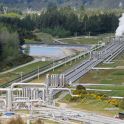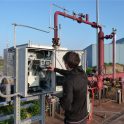
Geo-Dat
Project implementation
The project is implemented in several steps. To begin with, the data already existing in THEREDA are supplemented through database-driven research and own laboratory tests. Based on the extended data set, parameter files will then be generated specifically for geothermal considerations. Once the data set is complete, a reservoir model is developed with the objective to represent the conditions in a geothermal reservoir as realistic as possible.
Regarding its physical and geochemical boundary conditions, the structure of the model will be oriented towards sites known in the North German Basin. It is intended to use the model for further testing of the data base and investigations on the impacts of different influencing factors.
Validation with data from the practice
At the geothermal site Groß Schönebeck, extensive fluid monitoring takes place in parallel. All relevant chemical parameters are measured upstream and downstream of a heat exchanger in liquid and solid phase (mineral precipitates). The large dataset obtained this way allows the review (validation) of the model calculations performed with the new database.
Task of GRS
GRS co-ordinates all activities within the project related to the development of the thermodynamic database. GRS has expertise in the determination of data and parameters for thermodynamic modelling. For this purpose, the Geoscientific Laboratory is also available, which is equipped to meet the special experimental requirements with regard to highly saline solutions.
Co-operation partners of GRS in this integrated project are the Helmholtz Centre Potsdam ‒ GFZ German Research Centre for Geosciences and the Institute of Inorganic Chemistry of the TU Bergakademie Freiberg.
Project highlights Environment and Energy

Apart from hydropower, biomass, wind and solar energy, the relevance and use of geothermal energy has been growing over the last couple of years. This is why different research projects are currently looking into the further development of the technology, ways of reducing investment costs, and means of exploiting geothermal potentials in a safe way.

The share of renewable energies in the German energy mix is rising steadily. Deep geothermal energy is also already contributing to more climate-friendly energy. GRS researchers, together with Energie Baden-Württemberg AG (EnBW) and the Geosciences Centre of the University of Göttingen (GZG), have developed and successfully tested new methods and techniques in the BMWi-sponsored ANEMONA project to improve the economic efficiency of geothermal power plants.